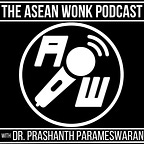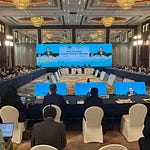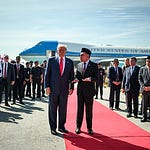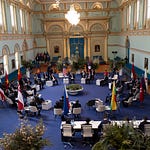INTRODUCTION
Our guest today is Dr. Thitinan Pongsudhirak, a professor and senior fellow at the Institute of Security and International Studies at Chulalongkorn University in Thailand. He is regarded as one of Thailand and Southeast Asia's foremost foreign policy thinkers and commentators and he's written and spoken widely on a range of topics we write about on ASEAN Wonk, including Thailand, the Mekong subregion, and ASEAN.
We start our conversation talking about major power competition in the Mekong subregion in mainland Southeast Asia and the future of post coup Myanmar. Make sure you watch, listen, or read the full episode as we go through a range of other subjects including Thailand's position amid US-China competition as well as ASEAN's future outlook.
Note: The transcript that follows the above free clip preview has been lightly edited for clarity and organized into sections for ease of quick browsing. For all ASEAN Wonk Podcast episodes, full video and audio podcasts, along with edited and sectioned transcripts as well as block quotes, will be a premium product for our paying subscribers, but we will include a short free transcript preview and a clip for all readers to maintain accessibility. Paying subscribers can find the rest of the full transcript and the full video podcast right below the paywall. If you have not already, do consider subscribing, and, if you have already done so and like what you see and hear, do consider forwarding this to others as well who may be interested. Thank you for your support as always!
THAILAND FOREIGN POLICY IN CONTEXT
So welcome to the podcast, Thitinan. Thank you for joining us. And let's start, if we can, on Thailand's geoeconomic and geopolitical outlook after a very event-filled few weeks in August, including the replacement of Prime Minister Srettha Thavisin with Paetongtarn Shinawatra and the breakup of the Move Forward Party as well, which won the most number of seats in Thailand's recent elections. So amid Thailand's political instability over the past two decades, at times it seems there’s a risk of a sort of creeping numbness about how the story is portrayed. Sometimes almost a sense of deja vu: another political party gets dissolved, another prime minister gets replaced.
You've actually written that this is not a particularly useful lens to understand where Thailand is today. This is more of Thailand being in a case of uncharted territory rather than deja vu and things happening all over again. And you've also written that even in terms of geopolitics and geoeconomics, there has been this notion in the past of sort of Teflon Thailand. But if you look at the economic growth trajectory of Thailand, relative to growth rates of, say, seven percent in previous decades, we're now looking at growth rates that have been reduced to more like three percent rather than seven percent. So having watched Thailand for decades, where are you and where should we be in terms of a scale of one to ten in terms of how alarmed or concerned we should be about Thailand's geopolitical and geoeconomic future given that domestic political trajectory?
Dr. Thitinan Pongsudhirak: Well, for Thai people, I think that we are very alarmed and concerned about Thailand being stuck in a kind of a standstill, in a pattern of holding ground, not moving forward over the last twenty years, really. I mean, it's been so dramatic. We had two military coups in 2006 and 2014. We had street protests, color-coded: yellow shirts in 2005, 2006, 2008, and then red shirts 2009, 2010, and then yellow shirts again, 2013, 2014. Two military coups, endless street protests, and then the three constitutions, 1997, 2007, 2017, and then the multiple party dissolutions. Winning parties in Thailand — political parties that won elections were dissolved — in 2007 Thai Rak Thai; 2008, another party aligned with Thaksin Shinawatra, second time dissolved in December 2008. And then, fast forward to the coup in 2014, and then you had election in 2019. Another party dissolved, Thai Raksa Chart. And in 2020, another major popular party which came in third, Future Forward Party of young people, a new kind of party for progressive reforms, structural reforms. It also was dissolved in February 2020, igniting protests throughout 2020 with young people taking to the streets and so on, and they were suppressed.
And then move forward to 2023 election. Again, the successor to the Future Forward Party became the Move Forward Party. It won the elections, securing 151 out of 500 seats, beating the Thaksin Pheu Thai party for the first time. The Thaksin party lost for the first time. And then Move Forward Party espoused structural reforms of the military, the monarchy, the economy, politics, bureaucracy in a wide-ranging reform agenda. It's a kind of agenda that Thailand needs to move forward into the world. As long as Thailand is stuck at home like this, it cannot move in the world. It can only go day by day. It can only kind of survive and crisis manage in foreign affairs, international situations, international challenges, but it cannot take a leading role. It cannot be proactive when it's so stuck at home.
“As long as Thailand is stuck at home like this, it cannot move in the world.”
So this agenda of the Move Forward became a threat to the establishment, especially to the monarchy and the military. And the monarchy, you know, the agenda is to reform the monarchy, to amend the lese majeste law, the draconian law. And for that pledge before the election, the Move Forward Party was dissolved again by the Constitutional Court. We had a lot of drama just in August alone, but the drama is repetitive. It's recurrent. It's a kind of drama we've seen over the last two decades. Party dissolution. On August 7, Move Forward was banned. Its leaders were banned for ten years from politics. And then one week later, the sitting prime minister from the Pheu Thai party, Srettha Thavisin, also was removed from office.
So now you have the daughter of Thaksin Shinawatra now is the new prime minister. There's been a setback because now the new government would need time to be formed, and the cabinet would need time to be vetted. And, you know, I think that it's difficult now to deny that what's at stake at home in Thailand is a constitutional order that's being contested. And the role of the military, the monarchy, judiciary within this constitutional order remains to be determined. I think that's what all this political inciting, protests, coups, military coups, and judicial interventions have been about. It's been about the role of the monarchy and the military, especially the monarchy within the constitutional order. And it is out of sync because it is very powerful but not so accountable. And hence, the move to reform these traditional institutions from the Cold War — the military, monarchy, bureaucracy, judiciary — is really the the sticking point. It's really the crux of the matter in Thailand, in Thai domestic politics. And moving forward, Thaksin also was brought back from exile. Paetongtarn is prime minister, but he also is a shadow prime minister. And we will see if the powers that be allow Thailand [to move forward] now that they've reset the post-election political situation by removing Srettha but also dissolving the Move Forward threat.
The Move Forward Party now has regrouped under the Prachachon Party, People's Party. It is in the opposition. So less of a threat in opposition, but the agenda remains a threat because it's a reform agenda. But now we will see if the powers that be allow the Pheu Thai government with Thaksin overshadowing it to actually implement policies and move Thailand forward even incrementally. If not, if the powers that be are determined to keep political parties weak and the government's kind of unstable and off balance, then Thailand will not be moving ahead and everything will suffer. The economy, I think we're seeing signs of stagnation. We're seeing signs of political decay. People don't respect the traditional institutions the way they used to. And we will see more of that. And for foreign policy, this is consequential and far-reaching because how can Thailand do anything in the world when it's so stuck at home, when it's so contentious at home? It cannot take a leading role in ASEAN in any fashion, let alone the broader international arena. So I think, you know, Thai foreign policy is really a function of what happens here at home.
MYANMAR CIVIL WAR FUTURES AND IMPLICATIONS FOR THAILAND AND ASEAN
ASEAN Wonk: Right. And I think it's a very important point that you make about the linkage between domestic political developments and Thailand's ability to lead abroad. And I wanted to ask: you've been a very keen observer of the situation in post-coup Myanmar, which obviously is very concerning. Beyond worries of sort of a failed state at the heart of Asia, which is at the very far end in terms of scenarios, there is a really increasing risk of state fragmentation as non-state actors assert their role. I had a chance to see the cross-border implications of this firsthand from across Thai border last year as well. And it really is very important for us to sort of take a view of an importance of a wide variety of actors, not just the SAC, not just the junta, not just other states and ASEAN itself as a grouping. And you've written extensively about this. There are also other worrying scenarios that the region is sort of worried about. For example, the junta at some point just holding sham elections in parts of the country, and then calling a few of its friends — the remaining friends it has — to legitimize this. And that doesn't really solve any of the problems in terms of the people in the country. But how are you thinking about some of the scenarios and and their likelihoods in Myanmar in the next one to two years, what are the things that we should be looking for as well in terms of signposts?
Dr. Thitinan Pongsudhirak: Well, Myanmar, since the coup in 2021, February 2021, has spiraled. There's a civil war, violent. Staging a coup was one thing, but consolidating power after the coup has failed. So it's the first successful coup that is failing, which means that the the military junta, the State Administration Council, has not been able to consolidate its power and it's actually been losing territory to a coalition of resistance groups led by the National Unity Government, but also the People's Defense Force and crucially, the ethnic armed organizations, the ethnic armies around the borderland regions. These borderland states are on the rim of Myanmar, and you have Rakhine State, Chin State, all the way up to Kachin, Shan state, down to Karenni, Karen state, Mon state. So all around the borders with Bangladesh and India and China and Thailand, all those states now are relatively increasingly autonomous. Moving forward, the SAC, the military is losing more and more ground, but it's holding out in the Burma Myanmar heartland, Naypyidaw capital, Mandalay, Yangon. So no borderland states now are under control really of the junta but the main heartland areas.
So I think that moving forward, we'll see different avenues possible. One would be that the NUG-led coalition prevails, and this means that the military junta will collapse. It might not be a precipitous, dramatic collapse like the fall Saigon, but it might be kind of an atrophy, which means that it just keeps losing territory. It loses more manpower, no new recruits, and then it runs out of ammunition. You know, it's been holding out by using air power, artillery and tanks. But eventually, something will have to give. So it could be that the military will lose and then the NUG-led coalition will win together with the PDF and the ethnic EAOs, ethnic armies. And then the NUG will be able to strike a compromise with the EAOs, the PDF and what's left of the Tatmadaw of the military. And that would be maybe the aspirational outcome. I think this would be the outcome under a federal democratic union that the NUG has been advocating, espousing. And the international community would also like to see a return to a semblance of stability that prevailed during the decade of reform progress and opening 2011 to the coup in February 2021.
Another scenario would be that the military holds out. This would drag on. It already has been for more than three years with armor, artillery and air power. The military could hang on and hold out for more months, especially with help from maybe China — to a degree, Russia, less of a help now — but, you know, the junta still has a lot of arms, a big arsenal to utilize to keep the resistance forces at bay. And this could drag on for another year, two years even. And that means more violence, more deaths, but maybe that will hold. And then they might even try to hold elections in the months ahead. And then it will have no legitimacy, no credibility. They will hope that it'll be a fait accompli, but it's a decreasing option. It's a decreasing chance because they keep losing territory. They've already lost all legitimacy. Their credibility within ASEAN is a big question mark because the junta leader, Senior General Min Aung Hlaing, has not been allowed to attend to take part in the ASEAN-related summits. So no legitimacy, no credibility, losing ground, you know, hard to see how they can hold any kind of election with any legitimacy. But they might try. So that could be a kind of a protracted, intractable kind of civil war moving forward.
“And then they might even try to hold elections in the months ahead…they will hope that it’ll be a fait accompli…”
Another scenario would be the resistance coalition — and they call this now a revolution against a military dictatorship — could triumph, could prevail, but it will not be led by just the NUG. But the military will lose more ground and eventually will lose authority. And Myanmar will be a different kind of country. No more SAC, but not NUG in the lead. The EAOs, ethnic armies, will try to administer their own states and you have this kind of fragmented new country with some inchoate rudimentary kind of central authority under NUG perhaps. And NUG, I have to say, has not been compelling enough with the visible leadership that can show both domestic constituencies and also international community that it can lead the way forward. So a central authority in this scenario would be not strong. And then you would have a strong borderland states — autonomy within Rakhine, Kachin, Shan state, Karen state, Chin state up to a point. And then you would have a new kind of country that is fragmented that will have to be renegotiated, but not smooth and nowhere near what we saw as a country before the coup in 2021. And this would leave open the space for India, China and Thailand to influence along its borders. This would be a kind of very motley, unstable, new country with a weak central authority.
So I hope that we will get some kind of a first scenario, a compromise led by NUG, but with participation from the ethnic armies, ethnic leaders in the spirit of the reforms that prevailed in 2008, 2009, 2010, 2011, and maybe some kind of return of that decade of compromise. But we also have to be mindful that we could end up with a very messy situation whereby Myanmar becomes a vulcanized, fragmented and unstable. And the cradle of transnational crime, drug trafficking, human trafficking. All kinds of things that could go along there could impinge on the regional states, and also the international community.
INTENSIFYING US-CHINA COMPETITION AND THAILAND’S MAJOR POWER BALANCE
ASEAN Wonk: Right. And I think the realities and the scenarios that you sketched out point to the fact that there are very complex series of realities in Myanmar. And and it's important to look not just at the aggregate actors at the very top level, but also subnational actors, non-state actors in a very diverse landscape, which has broader implications for Southeast Asia because what happens in Myanmar rarely stays in Myanmar alone. So that's something which is a really important point. I wonder if we could also pivot to the issue of something you've already addressed before, which is the future of Thailand's position amid US-China competition which is intensifying. As a US ally which also has cultivated close relations with China, Thailand's position is obviously being very carefully watched, even though — like other Southeast Asian countries — it's not entirely helpful to always view Thailand's foreign relations just in terms of that binary lens. I'm wondering how you think about Thailand's more challenging domestic political situation as affecting its broader geopolitical and geoeconomic orientation when it comes to this topic of US-China competition.
I mean, there is this tendency to sort of look at individual decisions, like the decision to try to buy Chinese submarines, the recent application to join BRICS, for example. And, of course, that's part of the story, although I would point out just like in the case of other Southeast Asian countries like Indonesia or Malaysia, there hasn't quite been, to my mind at least, a very clear economic case made in terms of why join BRICS relative to, say, the OECD, for example, where the case for internal structural reform and that connection is pretty clearly visible. So in the case of Indonesia, for example, you have calculations by the OECD that it would increase Indonesian GDP by 0.94 percent, but you don't see similar comparisons in terms of what that economic value proposition is for the BRICS. But I'm also really interested as well about how we might look ahead. So you mentioned, for example, Thailand's domestic challenges and democratic challenges. This has happened over a period of two decades, as you pointed out. If this continues to persist, how are we thinking about the question of how it affects younger generation of Thais and how they might perceive US China ties? And then how might that affect Thailand's trajectory in the longer term beyond these individual decisions?
Dr. Thitinan Pongsudhirak: Well, you mentioned the the word binary…
[Note: This is the end of a free preview podcast, with the full version in an earlier post published on September 26, 2024 available to our paying subscribers. This is not meant to serve as new content and is part of our free preview content within the dedicated website podcast section].











